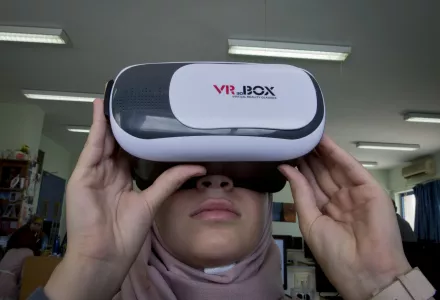
Executive Summary
Despite Israeli occupation and systemic governance challenges, the Palestinian economy faces a unique opportunity to build a thriving technology ecosystem. The current model of global philanthropy-driven tech development in the West Bank, however, is not working. Without a reboot, no progress is likely to be made. As early as 2012, a Cisco report proclaimed that, “Palestine is on the brink of becoming the next high tech global hotspot.” A decade later, this ambitious pronouncement remains unfulfilled. This paper outlines how international actors such as the US State Department can lead an effort, together with other key governmental and international institutions, to accelerate growth in the Palestinian tech sector. Long-term, the proposed model is intended not only to serve the Palestinian economy, but also to strengthen civil society, build state capacity, and facilitate regional collaboration.
We present a blueprint for rebooting the Palestinian tech ecosystem by creating a new entity—a champion for Palestinian technology—called the Global Palestinian Innovation Foundation (GPI). GPI takes its structure from the success of the US-backed Binational Industrial Research and Development Foundation (BIRD), largely credited with accelerating the development of Israel’s Startup Nation. This proposal is based on insights from primary market research, an extensive ecosystem mapping, a deep literature review and over 60 stakeholder interviews with key participants in the Palestinian, Israeli, and international technology ecosystems. Based on this research, we provide detailed schematics for how GPI can be set up and operated for maximum impact. GPI will be independent, well-resourced and globally backed to drive changes in the West Bank and kickstart the Palestinian tech sector. GPI will invest in and derisk private sector projects, support multinationals setting up in the West Bank and promote academic collaboration between Palestinian and international universities for enhanced engineer training. It will also drive regional collaboration—mainly with the Gulf states—leveraging the unique opportunities opened by recent political developments.
GPI’s funding will build on the momentum of recent initiatives to support the Palestinian economy, for example the recent US Middle East Partnership for Peace Act (MEPPA) that commits $250 million to local growth initiatives in the Middle East, the majority of which is expected to go to the Palestinian economy. The US Government, however, is not the only potential source of funds for GPI, and we also evaluate other public sources such as the Gulf countries, and the EU as well as “co-financing” models with the World Bank. GPI will collaborate with the Palestinian Authority, but will be completely independent of the PA and act with internationally recognized standards of governance and transparency. A top-tier Advisory Board is needed, comprising international business leaders and successful executives from the Palestinian Diaspora. This will allow GPI to strengthen ties between the Palestinian Diaspora and the West Bank ecosystem—critically needed for ecosystem success.
Deepening collaboration with Israel will not be part of the formally defined charter of GPI. However, the combination of Palestinian tech ecosystem growth and the vitality of the Israeli technology scene are bound to create such collaboration opportunities. Additionally, given that GPI will be charged with championing the cause for Palestinian hi-tech, influencing Israeli policy in areas such as infrastructure and freedom of movement, will fall under the entity’s purview.
We envision that GPI may become a model for similar future entities in the West Bank to promote areas of health, education, and energy. It may become part of a longer term effort by the US and other supporting governments to strengthen Palestinian civil society and build state capacity.
Halperin, Avner, Mahmoud Khweis and Ely Sandler. “Time to Reboot: A Blueprint for the Palestinian Tech Sector.” Belfer Center for Science and International Affairs, Harvard Kennedy School, July 2022








